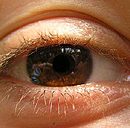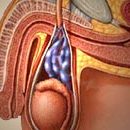A person may experience not only a decline in hearing, but also a complete deafness. How it is manifested? What's happening?
Content
Full deafness
 Rarely meeting full deafness is the result of bilateral destruction of snail cells perceive sound, and sometimes auditory nerves. In such cases, electrical stimulation of hearing nerve or hearing centers of the brain is needed to restore hearing. At the same time, very complex devices are used - cochlear (replaced by the properties of the snail of the ear) or the studios (with a violation of the auditory nerve) implants. By operation inside the bones of the skull, the finest wire is inserted - the electrode, and the electrical impulses are submitted immediately on the hearing nerve. This correction method requires long and complex rehabilitation.
Rarely meeting full deafness is the result of bilateral destruction of snail cells perceive sound, and sometimes auditory nerves. In such cases, electrical stimulation of hearing nerve or hearing centers of the brain is needed to restore hearing. At the same time, very complex devices are used - cochlear (replaced by the properties of the snail of the ear) or the studios (with a violation of the auditory nerve) implants. By operation inside the bones of the skull, the finest wire is inserted - the electrode, and the electrical impulses are submitted immediately on the hearing nerve. This correction method requires long and complex rehabilitation.
Pre-providing factors: the presence in the family suffering from hearing loss or other hereditary diseases (for example, underdevelopment of the inner ear bones), transferred during pregnancy of rubella, syphilis in the mother, the reception of drugs that harmfully affect the hearing, long-term oxygen starvation of the fetus during childbirth and congenital abnormalities ear, throat and nose.
Sudden deafness
Suddenly, the deafness has suddenly - this is a sharp hearing loss by a person who had no reason to complain about hearing. In such cases, it is necessary to accept urgent measures to restore hearing.
Causes and predisposing factors are diverse:
- acute infections (especially epidemic vapotitis, as well as measles, korea rubella, influenza, listened and infectious mononucleosis);
- diabetes, reduced function of the thyroid gland, high concentrations of fats and cholesterol;
- High blood pressure and arterial seal;
- Head injuries and brain tumors;
- medicines that harmfully act on the rumor;
- neurological diseases (for example, multiple sclerosis);
- Blood diseases (for example, leukemia and increased blood coagulation).
Sudden hearing loss can give symptoms of conductive, neurosensory and mixed hearing loss, depending on the cause caused its cause. If the rumor decreased as a result of the effects of noise, first a person loses the ability to hear the sounds of certain frequencies (about 4000 Hz), and then worse and worse distinguishes the sounds of all frequencies.
Summa's hearing loss
Headowing can develop as a result of the effects of noise, it may be temporary and constant. Hearing disorders arise with long-term effects of noise (85-90 dB) and short-term impact of very loud noise (more than 90 dB). Such a form of hearing loss is common in workers subjected to the constant influence of industrial noises, as well as military, hunters and rock musicians.
Aging ear
Elder tightness develops and progresses with age. It is caused by loss of hair sensory cells in the snail - the receptor apparatus of the auditory analyzer. For elder touginess, ringing in the ears and the inability to understand speech.









